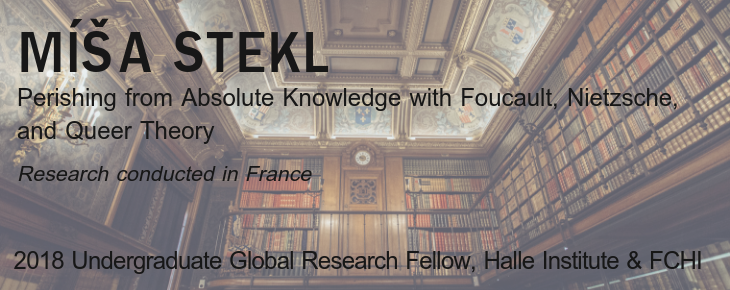
Míša Stekl, 2018 Global Research Scholar
Research Project: Perishing from Absolute Knowledge with Foucault, Nietzsche, and Queer Theory
Research Location: France
Majors: Philosophy and Comparative Literature
|
As most Emory undergraduates could likely attest, receiving an email from one’s academic department is rarely a thrilling – or even a particularly enjoyable – experience. Often, one scarcely finds the time in the helter-skelter of university life to read yet another forwarded notice for yet another event or program. But in the spring semester of 2018, as I was combing through my email archives, I happened upon a message about the Halle-FCHI Global Fellows Program which had been forwarded to me by the Philosophy department – and which would profoundly change the course of my year. How many undergraduate students could honestly claim the following: I received a fellowship from my university to undertake summer research in Paris? In fact, the Halle-FCHI program makes an even better offer – although Paris was my research location of choice, Global Fellows may propose to conduct research at any site in the world that is relevant to their senior thesis. But this fellowship is no summer vacation; it is a professional research experience the likes of which are rarely if ever afforded to undergraduate students, especially in the humanities. Without this experience, I would never have arrived at the novel directions that I am currently pursuing in my honors thesis. My thesis approaches contemporary debates in queer theory regarding identity and temporality by revisiting the questions of truth and of history raised by 20th-century philosopher Michel Foucault’s interpretation of his intellectual precursor, Friedrich Nietzsche. Through the Halle-FCHI Global Fellows Program, I was able to visit the recently opened Foucault archives at the Bibliothèque Nationale de France, where I spent three weeks transcribing a total 256 pages of unpublished Foucault manuscripts about Nietzsche. These manuscripts have radically advanced my understanding of truth and history in Foucault’s Nietzsche; while Foucault is most recognized in Nietzsche scholarship for his work, in the late 1960s, on Nietzsche’s genealogical method of historico-philosophical inquiry and the power relations that genealogy finds embedded within the history of accepted truths, my archival research recovered a much earlier (mid-1950s) and hitherto unexplored phase of Foucault’s reading of Nietzsche. My thesis will argue that this early phase, in which Foucault takes up Nietzsche’s way of “philosophizing with a hammer” as an attack upon the metaphysical grounds of Western thought, itself becomes the philosophical ground of the later Foucault’s historico-philosophical œuvre – and so also the implicit ground of Foucaultian queer theory. Foucault’s Nietzsche rigorously maintains that “to perish through Absolute Knowledge could belong to the foundation of being”: any knowledge which would lay claim to Absolute – universal, transcendental, final – metaphysical foundations can only do so in disavowing its own foundationlessness as the accident of history, of discourse, of perspective that it is in spite of itself. If Foucault’s Nietzsche destabilizes Absolute Knowledge, I will argue that he may also destabilize heteronormative “knowledge” of sexuality. Thus, my thesis will follow the tandem questions of Foucault’s Nietzsche – “What is truth?”, or better, “What is the political history of truth?” – and of the later Foucault’s History of Sexuality: What does it mean that sexuality has been produced as the “truth of ourselves”? I will suggest that re-reading queer theories of identity and of temporality through Foucault’s Nietzsche may open onto new understandings of the violence as well as the resistance that are occasioned in the historical construction of sexual identity. As its title suggests, my interdisciplinary project seeks to contribute to Foucault scholarship as well as to Nietzsche studies and to queer theory. But the title also reveals the extent to which many of my scholarly contributions have become possible with the support of the Halle-FCHI Global Fellows Program: “Perishing from Absolute Knowledge with Foucault, Nietzsche, and Queer Theory” is obviously inspired by the line of Nietzsche’s (see above) which Foucault also uses as the title of what is perhaps the most outstanding of his archival manuscripts. And without the unique opportunities and ongoing support that I have enjoyed as a Global Fellow, I could never have discovered these at-once foundational or grounding, anti-foundational or un-grounding, and ground-breaking writings that have become the core of my thesis. Never have I been more glad that I checked my email. |
